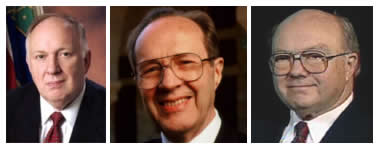 |
| Ambassador Brooks, Secretary Perry and Ambassador Matlock join FAS in call for continuing nuclear transparency under New START treaty |
.By Hans M. Kristensen,
Three former U.S. officials have joined FAS in urging the United States and Russia to continue to declassify the same degree of information about their strategic nuclear forces under the New START treaty as they did during the now-expired START treaty.
The three former officials are: Linton Brooks, former chief U.S. START negotiator and administrator of the National Nuclear Security Administration, Jack Matlock, former U.S. ambassador to the Soviet Union and Special Assistant to President Ronald Reagan for national security affairs, and William Perry, former U.S. Secretary of Defense.
At issue is whether the United States and Russia will continue under the New START treaty to release to the public detailed lists – known as aggregate data – of their strategic nuclear forces with the same degree of transparency as they used to do under the now-expired START treaty. There has been concern that the two countries might reduce the information to only include numbers of delivery systems but withhold information about warhead numbers and locations.
In a joint letter, the three former officials joined FAS President Charles Ferguson and myself in urging the United States and Russia to “continue under the New START treaty the practice from the expired START treaty of releasing to the public aggregate numbers of delivery vehicles and warheads and locations.” This practice contributed greatly to international nuclear transparency, predictability, reassurance, and helped counter rumors and distrust, the letter concludes.
Both governments have stated their intention to seek to broaden the nuclear arms control process in the future to include other nuclear weapon states and the letter warns that achieving this will be a lot harder if the two largest nuclear weapon states were to decide to decrease transparency of their nuclear forces under New START.
“Any decrease in public release of information compared with START would be a step back.”
The letter was sent to Rose Gottemoeller, the U.S. Assistant Secretary of State for Arms Control, Verification and Compliance, and Sergey Kislyak, the Ambassador of the Russian Federation to the United States.
This publication was made possible by a grant from Carnegie Corporation of New York and Ploughshares Fund. The statements made and views expressed are solely the responsibility of the author.
The last remaining agreement limiting U.S. and Russian nuclear weapons has now expired. For the first time since 1972, there is no treaty-bound cap on strategic nuclear weapons.
The Pentagon’s new report provides additional context and useful perspectives on events in China that took place over the past year.
Successful NC3 modernization must do more than update hardware and software: it must integrate emerging technologies in ways that enhance resilience, ensure meaningful human control, and preserve strategic stability.
The FY2026 National Defense Authorization Act (NDAA) paints a picture of a Congress that is working to both protect and accelerate nuclear modernization programs while simultaneously lacking trust in the Pentagon and the Department of Energy to execute them.